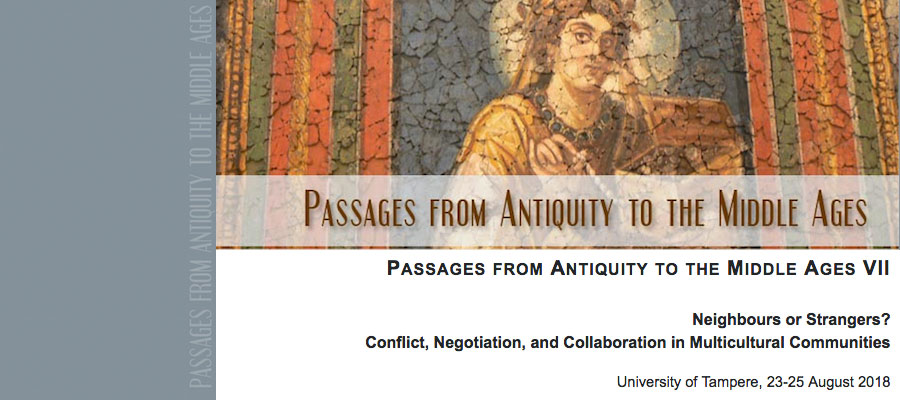Neighbours or Strangers? Conflict, Negotiation, and Collaboration in Multicultural Communities, Passages from Antiquity to the Middle Ages VII, University of Tampere, August 23–25, 2018
The aim of the international Passages from Antiquity to the Middle Ages conferences is to bring together scholars of various fields of study to examine and discuss various phenomena during the longue durée from Antiquity to the Middle Ages. The first 'Passages' conference was organised at the Department of History and Philosophy, University of Tampere, in January 2003. Since then there have been six conferences under the same concept, with topics varying from aging and death to social networks, religious participation and infirmity and health.
Questions of toleration, aggression and even hatred based on ethnic diversity have been accentuated in recent times, but multiculturalism in its various forms is far from being confined to the modern world only. The seventh international Passages from Antiquity to the Middle Ages conference will focus on forms of interaction and methods of negotiation in multicultural, multiethnic, and multilingual contexts.
The conference aims at concentrating on social and cultural interaction within and between multi-ethnic and multilingual communities, groups and individuals, minority (minorities) and majority. Cooperation, toleration, and coexistence was an everyday necessity in Ancient and medieval societies. On occasion, however, these would turn into the opposite: suspicion, conflict, and violence, enhanced by power struggles and prejudices. All these had a central influence on social dynamics, negotiations of collective or individual identity, definitions of ethnicity, and shaping of legal rules. What was the function of multicultural and multilingual interaction in various contexts: did it create and increase conflicts, or was it rather a prerequisite for survival and prosperity?
Our focus lies on society and the history of everyday life. We welcome papers, which have a sensitive approach to social differences: gender, status, and ethnicity. Actors, experiences, and various levels of negotiations are of main interest. We aim at a broad coverage not only chronologically but also geographically and disciplinarily (all branches of Classical, Byzantine and Medieval Studies). Most preferable are contributions that have themselves a comparative and/or interdisciplinary viewpoint or focusing on a longue durée perspective.
